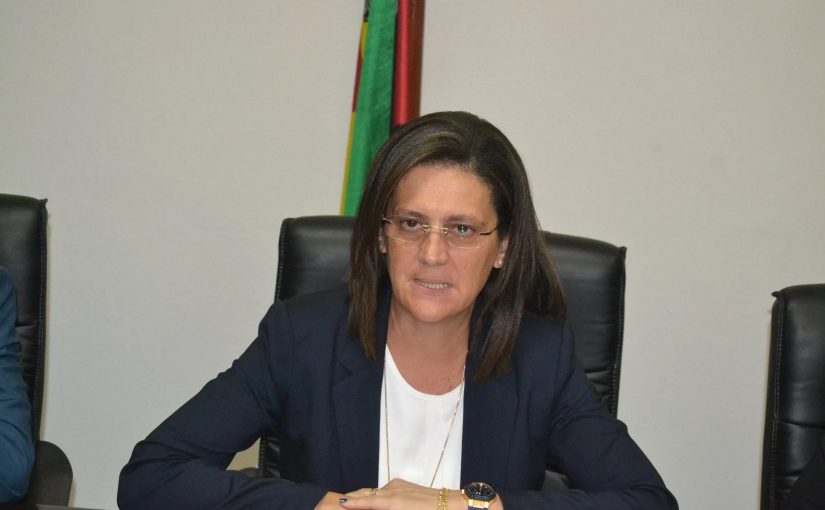Business conditions weaken again in June, but expectations improve - Standard Bank Mozambique PMI
INAE general inspector strikes back at critics

Rita Freitas, the general inspector of the Mozambican government’s National Inspectorate of Economic Activities (INAE), has struck back at her critics, warning that there are people inside the institution “who want to destabilise me”.
Up until mid-2016, INAE was an obscure corner of the state apparatus, with a very low profile. But when Freitas was appointed to head it, she thrust INAE into the limelight, with a series of inspections that led to the temporary, or occasionally definitive, closure of dozens of restaurants, shops, slaughterhouses and other establishments handling foodstuffs, which were found to be violating the most basic rules of hygiene.
The media were invited to accompany the INAE inspectors, and so, through television coverage, Mozambican consumers could see in their living rooms the filth and the vermin that all too often characterised enterprises selling food.
Interviewed in Friday’s issue of the independent weekly “Savana”, Freitas said a campaign is being waged against her, in order to protect those who violate public health regulations.
She mentioned no names, but said there were individuals who were used to working in a certain way, and their lives were disrupted when Freitas introduced a new dynamic into INAE.
“There are malcontents who can no longer do what they used to do, and they want to destabilise me so that they will have room for manoeuvre”, she said.
Her enemies have threatened an audit of INAE – but Freitas says she would welcome an audit. “It’s human to make mistakes, and all institutions have their strong points and their weak points”, she said. “I hope that the audit is held so that shortcomings can be corrected”.
But she stressed that she has not received any official information, and so has no idea when an audit might happen.
Freitas added that there was an “outside hand” also trying to destabilise her work, in order to paralyse INAE’s inspections, but she promised to resist this to the end.
She did not specify who this “outside hand” might be, but the Minister of Industry and Trade himself, Ragendra de Sousa, has intervened to suspend “Operation Kulaya” – an operation waged by INAE in order to promote “civic education” of economic agents, particularly about the need to label foodstuffs appropriately, and to ensure that basic foods (including grains, vegetable oil and salts) are fortified with micro-nutrients.
Sousa was particularly irritated at the media presence during INAE inspections. Speaking on Wednesday, he declared “We should not take the press on our supervisory and inspection activities. This is routine government work which does not need the presence of the media, and so I have ordered the suspension of the operation because of the way it was being conducted”.
This drew a retort from Fernando Goncalves, chairperson of the Mozambican chapter of the regional press freedom body MISA (Media Institute of Southern Africa) who said the Minister was violating Mozambican legislation on freedom of information.
“This is a violation of the law on access to information”, said Goncalves. “That law exists to ensure that the public has access to all information pertaining to government activities except that covered by national security concerns. INAE inspections are not matters of national security. If the media is barred from attending them, that’s a gross violation of the law”.
Freitas told “Savana” she did not know why Operation Kulaya had been suspended, since Sousa had not given her any reasons. But the government’s own economic programme, approved by the country’s parliament, gives INAE a target of 22,000 inspections a year, and so Freitas did not believe she needed any special permission to carry on inspecting.
She said it was not her intention to grab headlines, but merely to ensure that Mozambican consumers receive goods and services in a decent condition, in accordance with the law.
Freitas said that in the first quarter of the year INAE inspected 5,626 establishments across the entire country. 4,526 had no problems, and 586 were given warnings to improve the conditions offered to their clients. 463 establishments were fined a total of 24 million meticais (about 400,000 US dollars) and 49 were closed until they implemented instructions from the inspectors.
Many of the fines resulted from the selling of counterfeit goods. Since the fines are the same regardless of the quantity of counterfeit products on sale, business people have complained. But Freitas said that INAE can only implement the law, and Freitas said businesses who feel unfairly treated will have to take their cases to the courts.













Leave a Reply
Be the First to Comment!
You must be logged in to post a comment.
You must be logged in to post a comment.